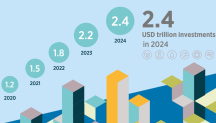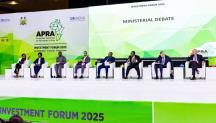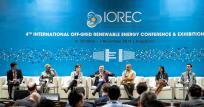
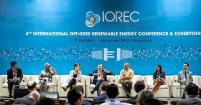
IOREC Underway: Leaders Gather to Unlock Investment and Accelerate Off-grid Deployment
Newsletter
The fourth edition of the International Off-Grid Renewable Energy Conference and Exhibition in Singapore is underway, gathering more than 300 high-level policy, intergovernmental, private sector and non-governmental participants from around the world. Delegates are sharing ideas and insights on the future of standalone and mini-grid renewable energy solutions and are identifying ways to scale-up their adoption.
Among the central themes in discussion is the challenge of connecting financing and investment with business owners and electricity consumers in developing countries – many of whom lack the resources and experience necessary to successfully secure finance. With standalone and mini-grid renewable energy solutions fuelling new business opportunities and supporting improved livelihoods for both sellers and consumers, participants have heard various perspectives on the challenges and opportunities of a decentralised energy system.
The Director-General of the International Renewable Energy Agency, Mr. Adnan Z. Amin, outlined in his opening speech that the business case for off-grid renewables had never been stronger – a fact widely recognised by the private sector, from start-up entrepreneurs to large scale international firms. He stressed that what will bring power to the un-electrified is not development aid, but viable and sustainable commercial activity. A point the off-grid business community widely agreed on as the conference continued to share experiences and showcase good practices.
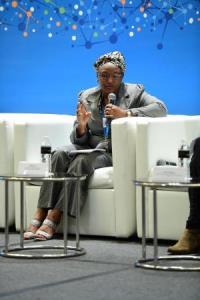
Habiba Ali, the Chief Executive Officer and Founder of Sosai Renewable Energies Company from Nigeria, underlined that what was needed is not new thinking, but learning from successful models and examples around the world, and finding ways to replicate them to the extent possible in new countries and for different communities.
Harish Kande, co-founder of SELCO Foundation located in Bangalore encouraged industry to look beyond the opportunity off-grid presents for lighting and mobile phones, but to consider renewables in a more fundamental way with direct impact on livelihoods. Finance, he indicated, remains an impediment to current efforts but there are enormous socio-economic returns for the world if energy access can be prioritised locally.
Off-grid renewable energy can go beyond the energy access goal under SDG 7, confirmed Kaveh Zahedi, the Deputy Executive Secretary for Sustainable Development at the United Nations Economic and Social Commission for Asia and the Pacific. He outlined that four million premature deaths linked to indoor air pollution could be tackled by increasing access to clean, low-cost energy. The role of decentralised renewable energy in tackling health will be discussed further at the Renewable Energy Solutions for Healthcare Facilities conference that follows IOREC.
“A $15 a month solar water pumping system allowed a farmer in Nepal to significantly increase milk production, and led to a healthier herd. She was able to expand her herd by 55 per cent.”– Off-grid renewables testimonials at #IOREC from Avishek Malla, CEO @SunFarmerTeam #IOREC pic.twitter.com/wFiEi8C06C
— IRENA (@IRENA) November 1, 2018
A discussion on the socio-economic benefits of off-grid renewable energy on day two, brought together practitioners from the field showcasing real life examples of the impact decentralised solutions are having on rural lives.
So what will it take to ensure we leave nobody behind by 2030? Itamar Orlandi, Head of Frontier Power Bloomberg New Energy Finance fuelled the debate with new estimates that universal access to energy requires USD 350 billion of investment. With grid extensions to remote communities likely to raise the cost of power, off-grid solutions led by renewables based technologies are the most effective way to achieve that access.
Better livelihoods and improved health through energy access delivered by off-grid renewable energy cannot be achieved without the policies in place to support it. To better understand what those policies are, IRENA took the opportunity to launch a new report on the policy and regulatory frameworks shaping the sector today.
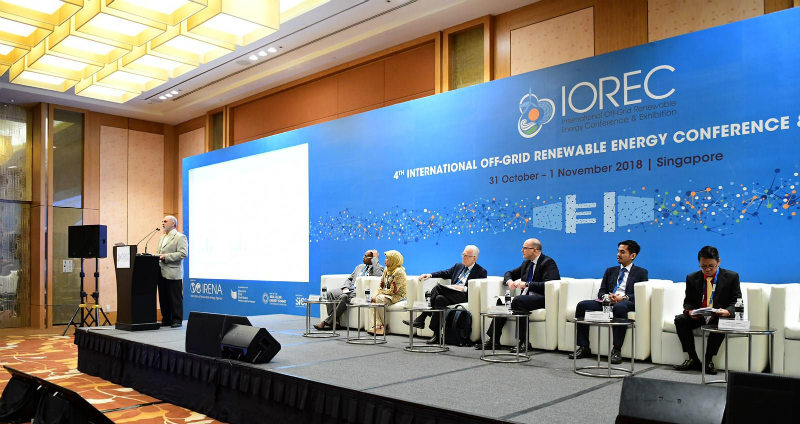
At the conclusion of the event, the Director-General spoke of the inspiring that this had IOREC had been an enriching experience, saying that he was struck by the tremendous sense of optimism present in an event where participants from around the world came to find shared experiences and share inspiring stories.
In partnership with the Alliance for Rural Electrification, IOREC took place alongside other high-level discussions during Singapore International Energy Week including the Association of South East Asian Nations Energy (ASEAN) Ministers Meeting, chaired by Singapore and is co-located with the Asia Clean Energy Summit.
The two-day event is followed by the Renewable Energy Solutions for Healthcare Facilities conference, organised by IRENA on 2 November.
